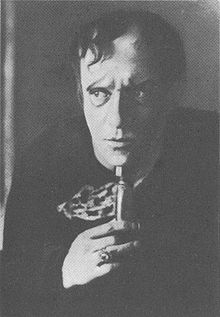Michael Chekhov
Although mainly a stage actor, he made a few notable appearances on film, perhaps most memorably as the Freudian analyst in Alfred Hitchcock's Spellbound (1945), for which he received his only Academy Award nomination.Subsequently, the outward gesture is suppressed and incorporated internally, allowing the physical memory to inform the performance on an unconscious level.Following developments in Germany that threatened the outbreak of war he moved to the US with the couple, and later writers, Anne Cumming and Henry Lyon Young to recreate a drama school.[5] Chekhov taught a range of movement dynamics such as molding, floating, flying, and radiating that actors use to find the physical core of a character.[citation needed] Despite his seemingly external approach, Chekhov's techniques were meant to lead the actor to a rich internal life.The English translation of his autobiography The Path of the Actor was edited by Andrei Kirillov and Bella Merlin and published by Routledge in 2005, marking the 50th anniversary of his death.

Saint PetersburgRussian EmpireBeverly Hills, CaliforniaOlga ChekhovaAda TschechowaAlexander ChekhovAnton ChekhovOlga KnipperVera TschechowaRussiandirectorauthortheatre practitionerKonstantin StanislavskiAlfred HitchcockSpellboundAcademy AwardMoscow Art TheatreStanislavski's 'system'Yevgeny VakhtangovLeopold SulerzhitskyVakhtangovOctober RevolutionnaturalisticAndrei BelyPetersburgStalinismspiritualistGermanySymbolistKaunas State Drama TheatreLithuaniaDartington HallEnglandAnne CummingcharacterMethod actingMarilyn MonroeAnthony QuinnClint EastwoodDorothy DandridgeMala PowersYul BrynnerPatricia NealSterling HaydenJack PalanceElia KazanRobert LewisPaula StrasbergGuy GilletteDorothy BridgesJohnny DeppAnthony HopkinsBeatrice StraightNetworkSimon CallowGregory PeckAugust StrindbergErik XIVMan from the RestaurantPhantoms of HappinessTroikaSong of RussiaIn Our TimeSpecter of the RoseCross My HeartAbie's Irish RoseTexas, Brooklyn & HeavenInvitationHoliday for SinnersRhapsodyLos Angeles TimesTCM Movie DatabaseInternet Broadway DatabaseNew York Public Library for the Performing Arts